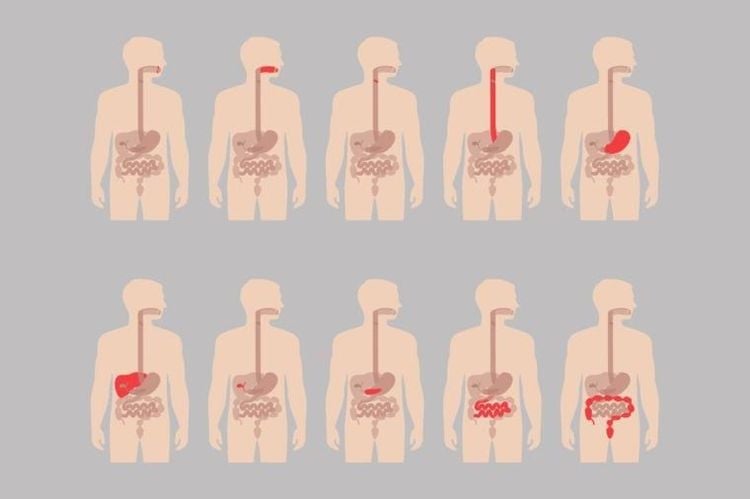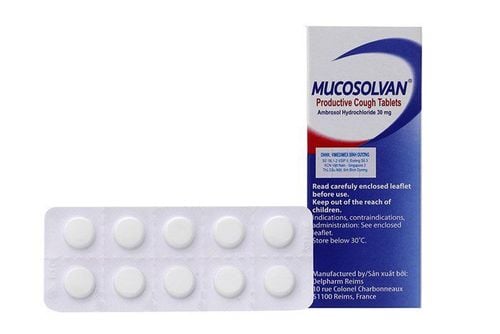The human digestive system is a very long tube, starting at the mouth and ending at the anus. Its main functions are ingesting food, breaking down and absorbing nutrients, eliminating unnecessary and toxic substances from the body. The digestive system of children is more special than that of adults in terms of anatomical and physiological characteristics. So how does the process of digesting milk take place and how long does it take a newborn to digest milk?
1. How long does it take the digestive system to digest food?
Human digestion time depends on many different elements, varies among individuals and between men and women. After you eat, it takes food about six to eight hours to pass through your stomach and small intestine.
In the small intestine, food will be broken down by digestive enzymes into nutrients and absorbed through the intestinal mucosa. The rest of the food continues moving to the colon (large intestine) for further digestion, absorbing almost all the water and some remaining micronutrients, and finally leaving only waste products and being excreted as feces. Food spends 24 hours moving in the large intestine before being excreted.
Under normal physiological conditions, the time for moving food in the digestive tract is specifically as follows:
- The time for moving through the stomach is about 2 to 5 hours
- The time for moving through the small intestine is about 2 to 6 hours
- The time for moving through the large intestine is about 10 to 59 hours
- The total time for moving food through the entire digestive tract is about 10 to 73 hours. Therefore, it takes food about 2 to 5 days to move from entering the mouth, breaking down and absorbing nutrients to being excreted as feces.
Some factors can affect the rate and time of food digestion include:
- Amount of food consumed
- Type of food eaten
- Gender
- Individual metabolism
- Whether digestive pathologies are involved.

2. How does the digestion process of milk take place?
Milk is now considered one of the most nutritious and easy-to-use foods. However, few people know that human ancestors about 10,000 years ago were completely unable to digest milk. And now nearly 2⁄3 of adults in the world (mainly in East Asia and South Africa) are more or less affected by lactose intolerance syndrome.
Whether milk is easy to digest or not mostly depends on an enzyme called lactase. When entering the body, lactose is only broken down by a special enzyme, called lactase, secreted in the small intestine into simple sugars, glucose and galactose, and then is absorbed into the body.
If the body lacks or cannot secrete the enzyme lactase, lactose in milk is not broken down, absorbed, and will move down to the colon and be metabolized by the bacteria there. Therefore, people with lactose intolerance often have symptoms of bloating, indigestion, flatulence and diarrhea... when consuming cow's milk.
3. How long does it take a newborn to digest milk?
In general, the digestion time of milk or dairy products can last up to 12 hours. Meanwhile, the digestion time of regular fruit juices only takes about 15 minutes. Therefore, the answer to whether milk is easy to digest or not is that milk is a relatively difficult food to digest. So how long does it take a newborn to digest milk? To answer this question, we need to understand the ability to digest milk in this group of children.
In the first 24 hours, the intestines of newborns are completely free of bacteria. Starting from the 3rd day after birth, new kinds of intestinal bacteria begin to multiply and develop strongly. In breastfed babies, beneficial intestinal bacteria strains such as Bifidus, B. lactis aerogenes, B. acidophilus are often more dominant because breast milk contains a lot of beta lactose and Bifidus element, which is good for the growth of the above bacteria strains and at the same time inhibits E Coli bacteria. In contrast, cow's milk contains a lot of alpha lactose, which is good for the growth of E coli bacteria.
Beneficial bacteria strains in the intestines play a very important role in food digestion, they take part in the synthesis of some vitamins (such as vitamin B, K), digest other substances such as protein, fat, sugar. Therefore, intestinal dysbiosis will affect the ability to digest and absorb food in children.
Overall, the digestive system of infants and young children is not yet fully developed. However, the digestion time of breast milk will certainly be faster, the tolerance is higher than cow's milk or formula milk. The reason is that breast milk is both rich in nutrients and contains many factors protecting the baby's body, and it is more suitable for the immature digestive system. So breastfed babies are less likely to have digestive disorders and simultaneously reduce the risk of other infectious diseases.

The digestion time of breast milk depends on the time the milk remains in the baby's stomach. Under normal conditions, about 25% of the milk is absorbed directly in the stomach, the digestion time of breast milk in the stomach is about 2 to 2 hours and 30 minutes, while the digestion time of cow's milk in the stomach is up to 3 - 4 hours.
After that, about half of the milk moves down to the small intestine for digestion in about 45 minutes, this is the main stage for absorbing the nutrients in breast milk. In the meantime, for formula milk, the time to do the same job is up to 80 minutes due to the larger amount of residue (unabsorbed), the higher level of milk precipitation, and the casein component (a type of protein found in milk) is also more difficult to digest.
To arrange an appointment, please call HOTLINE or make your reservation directly HERE. You may also download the MyVinmec app to schedule appointments faster and manage your reservations more conveniently.













